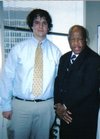Curtis Freeman on W.A. Criswell
Curtis Freeman, director of the Baptist House of Studies at Duke Divinity School, has an interesting article in the Journal of Southern Religion that analyzes W.A. Criswell's "change of heart" on the issue of race. Read the article here.
In the article, Freeman challenges Russell Moore's contention that liberals don't deserve the credit that they receive for leading the charge for civil rights for African-Americans.
Here's a snippet:
Commenting on the changing views of segregationists like Criswell, historian Andrew Manis states that civil rights was the one and only instance in which liberals in the SBC won the war. Baptist theologian Russell Moore disputes this widely shared claim that credits liberals with the advances in civil rights over the obstructionism of conservatives. Instead, Moore maintains that conservative evangelical religion, not the liberal social gospel, was responsible for overcoming segregation. Moore contends that Southern Baptist progressives have been falsely given credit for crucifying Jim Crow. Contrary to the consensus view represented by scholars like Manis that stresses liberal political pressure, Moore contends that “Jim Crow was . . . drowned, in a baptistery,” adding that conservatives only “needed theological liberals to remind us of what we said we believed.” Progressives who advocated for civil rights played a role in defeating segregation, but Moore holds that because they realized the theological bankruptcy of the social gospel, liberals adopted the strategy of shaming conservatives with the message of born again religion until conservatives came to see segregation as a repudiation of the gospel. Liberals, he continues, “appealed not to America’s reason, but to America’s conscience” by issuing a call to evangelical and revivalist notions of individual conversion and churchmanship: “It is to our own shame that we ignored our own doctrines to advance racial pride. And it is to our further shame that, in so many cases, we needed theological liberals to remind us of what we said we believed.”15
Moore’s implication, that appeals to conscience are conservative but that challenges based
in reason are liberal, over-generalizes. Progressive voices in the SBC like Porter Routh and Clifton Allen who led the way in drafting the 1968 “Statement Concerning the Crisis in Our Nation” over the objections of conservative evangelicals were not rationalistic liberals merely borrowing conservative evangelical language in the sense Moore ascribes. Nor does his remarkable claim square with the history of aggressive and residual white supremacy that was endorsed by conservative Southern Baptists like Criswell who distinguished between the evangelical gospel of soul salvation, which they affirmed, and the social gospel of soup and soap, which they despised. Just in case anyone might be left wondering what could possibly lead someone to such a radical revisionist interpretation of civil rights, Moore has a simple answer. He was concerned that liberals were continuing the same strategy by putting pressure on contemporary evangelicals “to accept new movements—from feminism to homosexual liberation and beyond—as the legitimate heirs of the civil rights movement.”16 In his rush to counter new liberal advances, Moore conjectures that as conservatives were victorious over liberals in the Baptist battles, so they must also have bested liberals in the race battles. Given that from 1956 to 1979 Criswell was a definitive voice of conservative evangelical theology, his altered views on race provide a case study to test Moore’s argument.


1 Comments:
Thanks for this post, I'm still waiting for someone to respond. Frankly, I'm astounded that no one has any comment to offer. Russell Moore's perspective on this makes me so incredibly angry that it is hard to remain calm. His perspective seems to be that if any good has come among Baptists then conservative Southern Baptists are the source. I grew up in Tennessee in the 60's and 70's -- I didn't see Jim Crow getting baptized in any SBC baptistries and I did see people like Clifford Allen and Porter Routh taking heat for suggesting that the SBC had a problem with race. I'm glad that there is improvement, but we've still got a problem with race that may only be solved by funerals.
11:49 AM
Post a Comment
<< Home